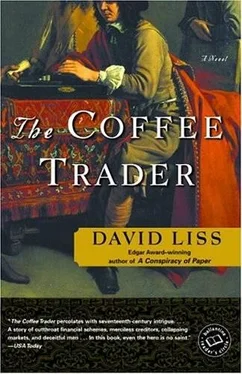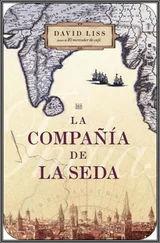Thinking about Joachim’s pretty wife left Miguel feeling more generous than he might have been otherwise. “I don’t have very much on me,” he said. “Nor have I much elsewhere. But I can give you two guilders if that will help your immediate needs.”
“Two guilders is but a paltry beginning,” Joachim said. “I’ll consider it but the first payment of the five hundred I lost.”
“I’m sorry you believe yourself injured, but I have business to attend to. I can hear no more.”
“What business is this?” Joachim asked, stepping in front of Miguel, blocking his exit. “Business without money, is it?”
“Yes, so you may find it in your best interest not to hinder my efforts.”
“You should not be so unkind to me,” Joachim said, shifting to heavily accented Portuguese. “A man who has lost everything can lose nothing more.”
Some time ago, when they had been on far more pleasant terms, Miguel had muttered something to himself in Portuguese, and Joachim had astonished him by answering back in that language. Then he had laughed and told Miguel that in a city like Amsterdam one must never assume that a man does not understand the language you speak. Joachim used Portuguese now perhaps to suggest a dangerous intimacy, a familiarity with the ways of the Portuguese Nation, including the power of the Ma’amad. Was the Portuguese a threat, an indication that, if he did not get what he wanted, Joachim would tell the council that Miguel had been brokering for gentiles?
“I’ll not be menaced,” he said in Dutch. He held himself straight.
Joachim pushed Miguel. The gesture lacked power; it was almost contemptuous-just a little shove, enough to make Miguel take a step and a half backwards. “I think,” he said, mocking Miguel’s accent, “that you will be menaced.”
Miguel had no idea what to say. He hated Joachim well enough for threatening him with the Ma’amad, but to threaten him with violence was more than he could endure. But what could he do, strike at him? The dangers of striking a madman aside, Miguel could not risk a violent confrontation with a Dutchman. The Ma’amad would expel him without a moment of hesitation. Back in Lisbon, he hardly would have hesitated to beat this wretch bloody, but here he could only stand impotently.
Sensing Miguel’s hesitation, Joachim flashed his broken teeth with animal menace.
Around him Miguel noticed the glances of passing strangers: a neatly dressed Jew locked in uncomfortable conversation with a beggar. Among the openly curious Catholic Portuguese, this strange pair would have been surrounded by a crowd of curious maids and peasant housewives, staring with open amusement as they wiped their floured hands on their aprons, laughing and heckling as though this conflict were a puppet show staged for their pleasure. Here, among the Dutch, who had taken to heart the introspective doctrine of their Reformed Church, the curious looked away politely, as if to cast their eyes upon someone else’s business was shameful. Surely they had troubles of their own that needed tending.
“We understand each other,” Joachim said. “I’ll take those two guilders.”
Miguel took a step back, but he considered it a defiant retreat. “You’ll get nothing from me now. I offered you kindness, and you repay me with impudence. Keep your distance from me, or shit-smeared straw and piss gruel will seem to you the greatest luxuries in the world.”
Miguel turned in the other direction and headed toward the Exchange, pushing his legs, now heavy and stiff, as quickly as he could, trying to erase the discomfort of the encounter by doing something decisive. He replayed the incident again and again in his mind. He should have given the fellow his two guilders. He should have given him ten. Anything to make him go away.
“Damn my pride,” he murmured. A madman might say anything to anyone, including the Ma’amad. If Parido should learn that Miguel had been brokering for a gentile, all his protests of goodwill would be like smoke in the air.
A few weeks before, Miguel might have even struck Joachim and allowed the consequences to come as they may. Now he had too much to lose. He would not put his new expectations at risk for a disgruntled vagabond. He would see Joachim at the bottom of a canal first.
Hannah loved to visit the fish market during Exchange hours because she had to pass along the Dam and would occasionally catch sight of Miguel. He would be oblivious to her presence, locked in conversation with some great merchant or other, his confidence radiating, one hand contemplatively rubbing his bristly beard. He would laugh and slap his friend upon the back. She had never seen him so at ease as when he was upon the Dam, and she liked to believe that this agreeable happy man was Miguel’s secret self, at home in the shadow of the palatial Town Hall and the glorious Exchange, the self he would become once he cleared himself of his debt and his brother’s yoke.
Daniel had grown particularly fond of herring, since their arrival in Amsterdam, and wanted to eat it three times a week, prepared in stews, or in sauces with raisins and nutmeg, and sometimes smothered in butter and parsley. The stall keepers down at the fish market had a hundred ways to sell bad herring, but Annetje knew all their tricks and made herself useful in testing the most handsome specimens for signs of being slicked with oil, dyed, or salted to hide the smell of rot. After the women bought their fish, they crossed the Dam to seek out sellers of vegetables and, as Daniel had been generous with money that morning, fruit for after the meal. As she went about her purchases, Hannah kept her eyes on the Exchange, never knowing when she might be treated to a glimpse of Miguel, aglow in his pecuniary glory.
Annetje had been unusually kind to her since their church outing. She knew nothing of Hannah’s fleeting encounter with the widow, so she could not guess why Hannah had returned to her care so sullen. The girl had brought her home and given her hot wine with extra cloves. She had cooked leafy cabbage for her to improve her blood, but if her blood had improved, Hannah showed no signs of it. Annetje joked with her, snapped at her, coddled her, poked fingers in her sides, and by turns kissed and pinched her cheeks, but nothing worked. The girl eventually settled in with Hannah’s new moodiness and declared she would not waste her time attempting to coax so sad a mope into better spirits.
Hannah had thought to tell her. She wanted to tell someone, but she had been in no mind to share more secrets with the girl, so she said nothing. She lay in bed at night thinking of that wicked stare, and once or twice she had thought to awaken Daniel-or merely shove him, for he was often enough awake with aching teeth-and confess all to him. He would never cast her out, not while she carried his child. Still, she kept her tongue. She thought about telling Miguel. The widow was his friend, after all, but she could not even dream of explaining to him what she had been doing in that part of town.
No one need know, she repeated to herself during those long nights. No one would find out, and there would be no consequences if she just kept silent.
Only the coffee berries comforted her now. She had slipped down to Miguel’s cellar once more and slid a handful into her apron. One handful. How long would that last? So she took another, and then a half handful to be sure she need not come again so soon. Inside the sack, the beans appeared diminished, but Miguel would hardly notice. If he traded in the fruit, he might get more as easily as he pleased. For all she knew, this was a new sack entirely.
Now, as she and Annetje returned to the Vlooyenburg, their baskets heavy with fish and carrots, she chewed on her berries, working them slowly so they might last longer. But even though she had eaten a dozen berries or more, the fear pulled at her, and she began to wonder if the effect of the fruit was no match for the terrors that now lurked everywhere.
Читать дальше












